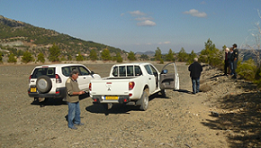Two weeks ago I visited Cyprus to discuss a pilot project as part of our Alyssum initiative. The alyssum plant can absorb nickel and can concentrate extremely high levels of this metal in its tissues when grown in the right soil. We want to prove that this can be developed into an economically feasible mining process.

On Cyprus, we visited an old asbestos mine with nickel-rich soil. Currently the mine is being rehabilitated and we examined some plots which are suitable for the cultivation of alyssum. We met with the Cypriotic Geological Survey Department and talked to the Department of Forests, the latter is managing the mine-rehabilitation project. These two departments will cooperate with us to manage the planned Alyssum pilot project in Cyprus.
The most interesting experience during this trip was how much you can learn in a couple of days by just being somewhere. Of course, you collect a lot of photographs, brochures, drawings and documents during such a visit, and I learned a lot about geology. Nevertheless, just talking with people, driving around, drinking coffee and making observations is invaluable. All in all, it proved to be a most successful visit, which paved the road for an auspicious project.
Nickel bio-ore
I picked up some alyssum samples to analyse in The Netherlands. This should result in some more certainty regarding our basic assumptions, and should guide us when designing our pilot project. We aim for a very, very interesting goal: the production of a nickel bio-ore. The snag is that cultivating the alyssum can be regarded as an agro-economic activity, but producing a nickel ore from the plants cannot be regarded as a mining activity, at least not by present standards.
Thus, the project shall have to come up with new standards to prove the feasibility of mining nickel from plants. This is what makes the project really challenging. In the mining industry everyone thinks big, but dealing with a much smaller production scale based on agricultural techniques requires a different philosophy. It needs flexible thinking to address this challenge, but I’m convinced it can be done.
Originally published on Wijnand’s private blog.
